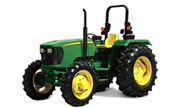I just noticed a bobcat ct 4045 only has a 3 cylinder engine. Looking at Kubota's similar weight/hp class with L4701 is a 4 cylinder engine. How much power difference is this between the two?
I have had three cylinder diesel engines in tractors and four cylinder diesel engines in tractors. In the simplest terms I prefer three cylinder, naturally aspirated engines simply because there are fewer parts to go wrong.
Note that Kubota uses just one four cylinder engine in the
L4701 (naturally aspirated), MX series (turbocharged) and all the Kubota Grand L tractors (some naturally aspirated, some turbocharged), less the three cylinder
L3560.
As one who used to study the efficiency of winery bottling lines I can tell you long production runs lower unit volume costs by significant $$. Same for tractor engines production runs.
You can easily determine the factory stated horsepower but it is difficult to determine if spec is for gross or net horsepower. All engine horsepower has to pass through the tractor transmission before it can accomplish work, which varies from 8% to 20% power loss. Therefore PTO horsepower will give go the most useful information for comparing tractor functional power output ~~~ but few consumers researching compact tractors are interested in this spec.
Deere 5075E has the most powerful three cylinder diesel engine I know of. Approximately 20% power loss from engine to PTO.
John Deere 5075E Engine
 |
| 2008 - 2022 | | Model year 2008-20122013-20142015-2022 | | 5E Series | | Utility tractor |
|
| Engine Detail | |
| John Deere PowerTech 3029H | |
| turbocharged diesel | |
| 3-cylinder | |
| liquid-cooled | |
| Displacement: | 179 ci
2.9 L |
| Bore/Stroke: | 4.19x4.33 inches
106 x 110 mm |
| Rated Power (EC 97/98): | 75 hp
55.9 kW |
| PTO Power (Claimed) | 61 hp |
Also I've noticed bobcat has bigger hydraulic flow which means a loader and backhoe should move faster?
I've also read where the Bobcats lift capcity on the specs is off as it doesn't include the loader weight. The lift is actually minus the loader weight. Are all tractor specs like this?
All 'regulars' contributing to T-B-N grope for accurate information.
No governement agency directly polices published tractor specs. Nor are there agreed industry standards. "Trade puffery" is legal. Fraud is not.
The comprehensive Nebraska state tractor tests show Nebraska measured results but almost all tractors tested are Big Ag tractors. Few compact category or utility category tractors are tested.
Take some time to research the service reputations for your local tractor dealers. Also research the service reputations of local welding shops.
A quality dealer, reasonably close, available for coaching, is important for tractor neophytes. Most new tractors are delivered with a glitch or two requiring correction. My kubota dealer is six miles away. I feel my local dealer continues to add value to my equipment after eight years. Dealer proximity is less important for those experienced with tractors and qualified to perform their own maintenance.

